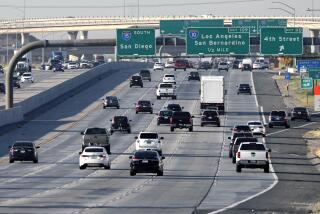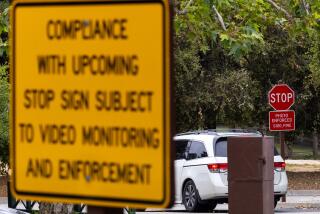Writs of Summer : Free Time Puts More Youthful Drivers Behind the Wheel--and Before the Bench
- Share via
School’s out, the kids are on the streets and San Fernando Valley traffic courts for teen-agers are entering their busiest time of the year.
“The volume of juveniles with tickets has just increased dramatically” since the Fourth of July, said David P. Beach, a referee at Juvenile Traffic Court in San Fernando. More teen-agers appeared in his courtroom last week than during any other week this year, Beach said.
“The volume always picks up in the summer,” said Leo Moriarty, supervising referee for the county’s 13 juvenile traffic courts. “The kids are out of school, at summer jobs. . . . Their propensity to receive citations is greater because their exposure is greater.”
50 Cases Daily
Every morning, about 40 to 50 anxious teen-agers, accused of everything from jaywalking to reckless driving, visit small courtrooms in San Fernando and Van Nuys, the two places where youths go to traffic court in the Valley.
Most teen-agers who get traffic tickets plead guilty, but those who contest the citations go to courtrooms designed for intimacy, not intimidation, officials say.
“I think that the small, intimate setting of juvenile traffic court encourages honesty,” said Mina Fried, court referee in Van Nuys.
The court is for anyone under 18. Shorts, jeans and T-shirts are the usual dress. The youngsters are required to appear before the black-robed referee accompanied by at least one parent. The parents, officials say, generally like the system and appreciate lectures that might scare their offspring back into the slow lane.
“I think it’s good,” said a Northridge man who appeared last week with a 14-year-old son who had ridden his brother’s motor scooter without a license. “I want to know what’s happening to my son.” One thing happening is that he’ll pay the $68 fine from his savings, the father added.
Leniency Favored
Referees have wide discretion in sentencing. Beach says he tends toward leniency on first offenses, some less serious ones and insurance violations, which are among the most potentially expensive tickets.
“I think he learned a lot, and I think it was a good experience,” the Northridge man said of his 14-year-old. “Now he’s accepting the consequences of his own action.”
That’s precisely the aim of Beach, a former juvenile counselor who worked with drug addicts and alcoholics.
“My objective is for a minor to leave here feeling he’s gotten a fair shake, and not that he’s just been processed through the system,” Beach said. “The image we project in Juvenile Traffic is an image that may stay with them a very long time.”
Fried said: “Most of the time, this is their very first contact with the court and I want them to feel respect. . . . I also want them to walk away with a positive image, that the court is concerned about them.”
The court was established in 1961, when juvenile courts found they could no longer handle the large load of traffic cases, Moriarty said. It started with 80,000 cases a year and has grown to 110,000.
About a third of the tickets are for serious offenses such as driving without a license, reckless driving or drag racing. Punishments can include a warning, traffic school, community service, a big fine and the loss of a driver’s license.
The referee is both judge and prosecutor. The youth can hire a lawyer or have one appointed by the court or, of course, plead guilty.
Beach advises the ones who intend to fight on “the difference between a reasonable excuse and a legal defense.” As a result, youths often come with charts, photographs and figures to show they hadn’t been going that fast, Beach said.
Youths Win One-Third of Cases
Of the 3% of the cases that go to trial, he said, the teen-agers win about a third. If a youth loses but has clearly spent a lot of time preparing his case, he often is sentenced to traffic school instead of being fined, Beach said.
In the courtroom, Beach reviews the law, asks the youth about the violations and then talks with them.
“I’ll ask them anything to help them feel comfortable,” he said.
Conversations run the gamut from roller coasters at Magic Mountain to post-graduation plans--or gang affiliations.
Beach encourages young people to stay in school, get jobs and take charge of their lives.
“He’ll go by the book. He won’t cut you any slack. But he just has a nice way of saying it,” said a 17-year-old accused speeder from Pacoima who was in the court for a second time.
More to Read
Sign up for Essential California
The most important California stories and recommendations in your inbox every morning.
You may occasionally receive promotional content from the Los Angeles Times.










